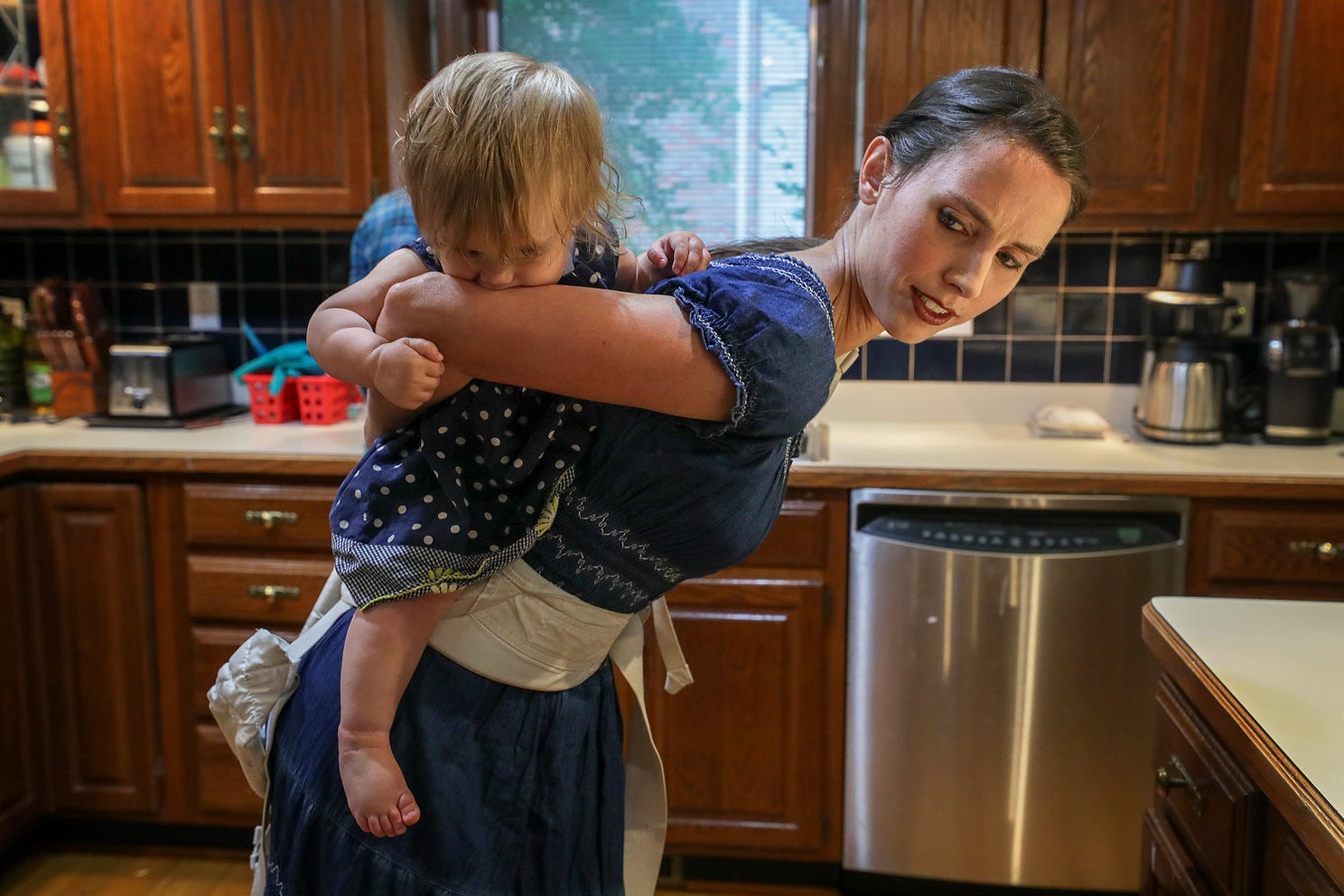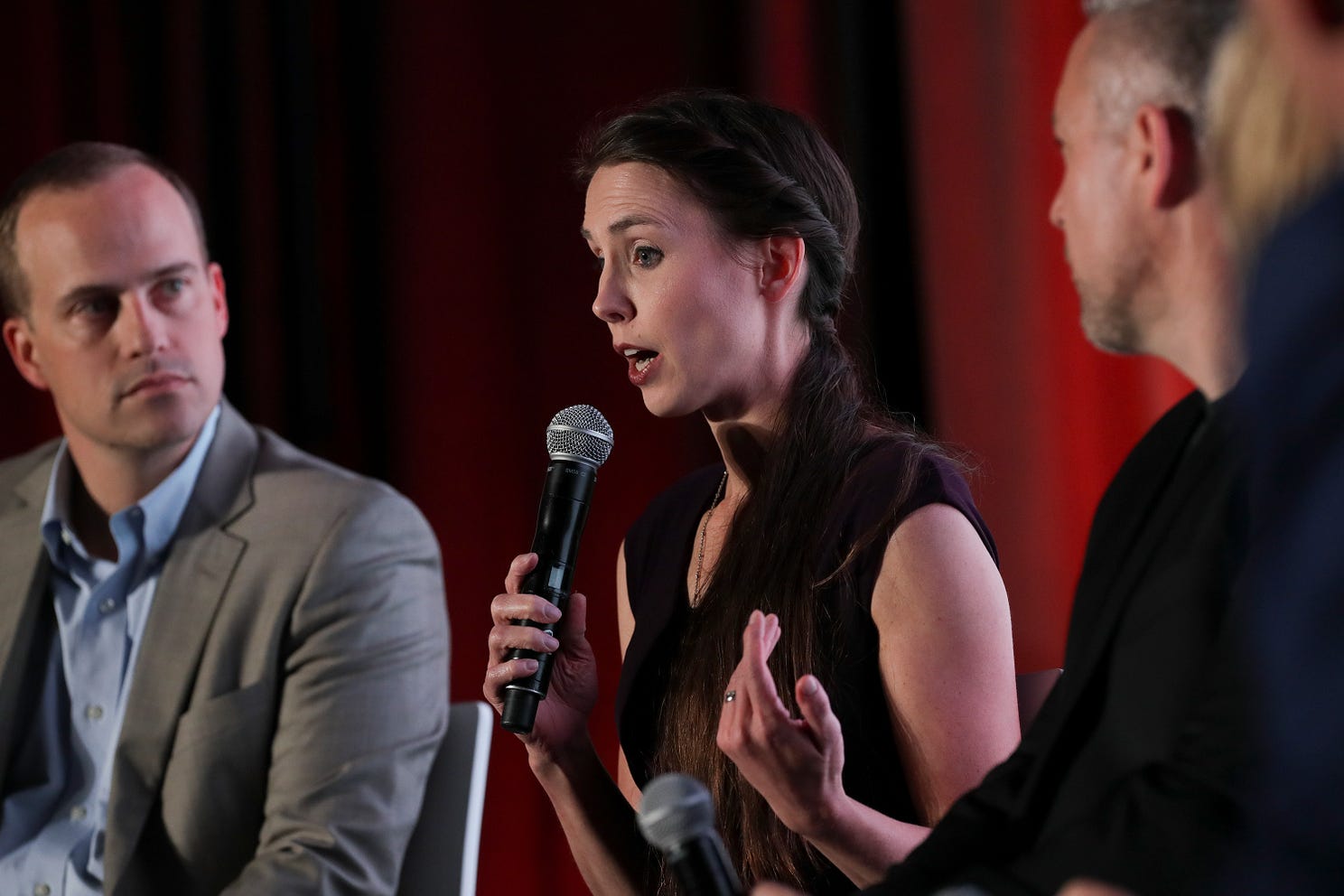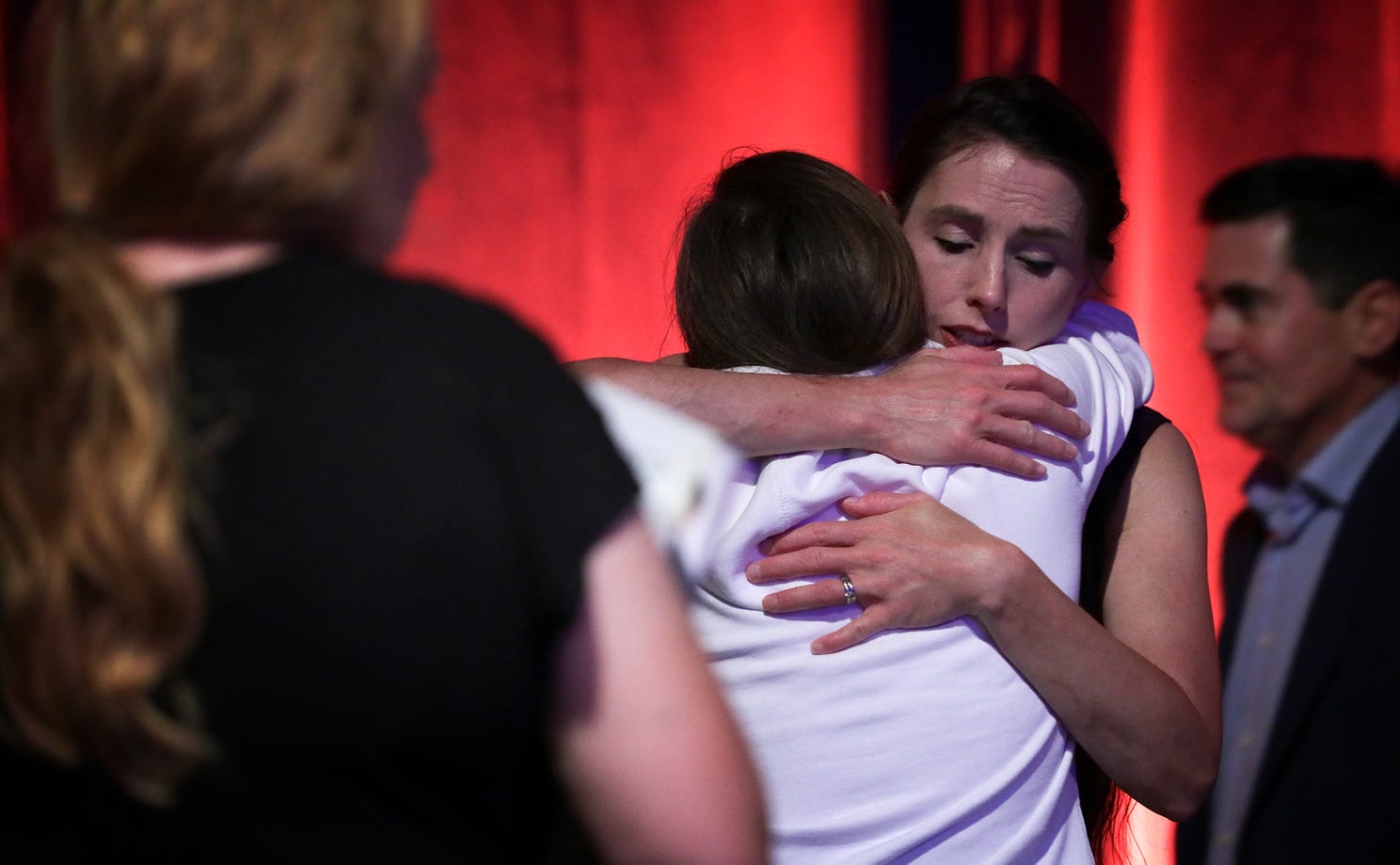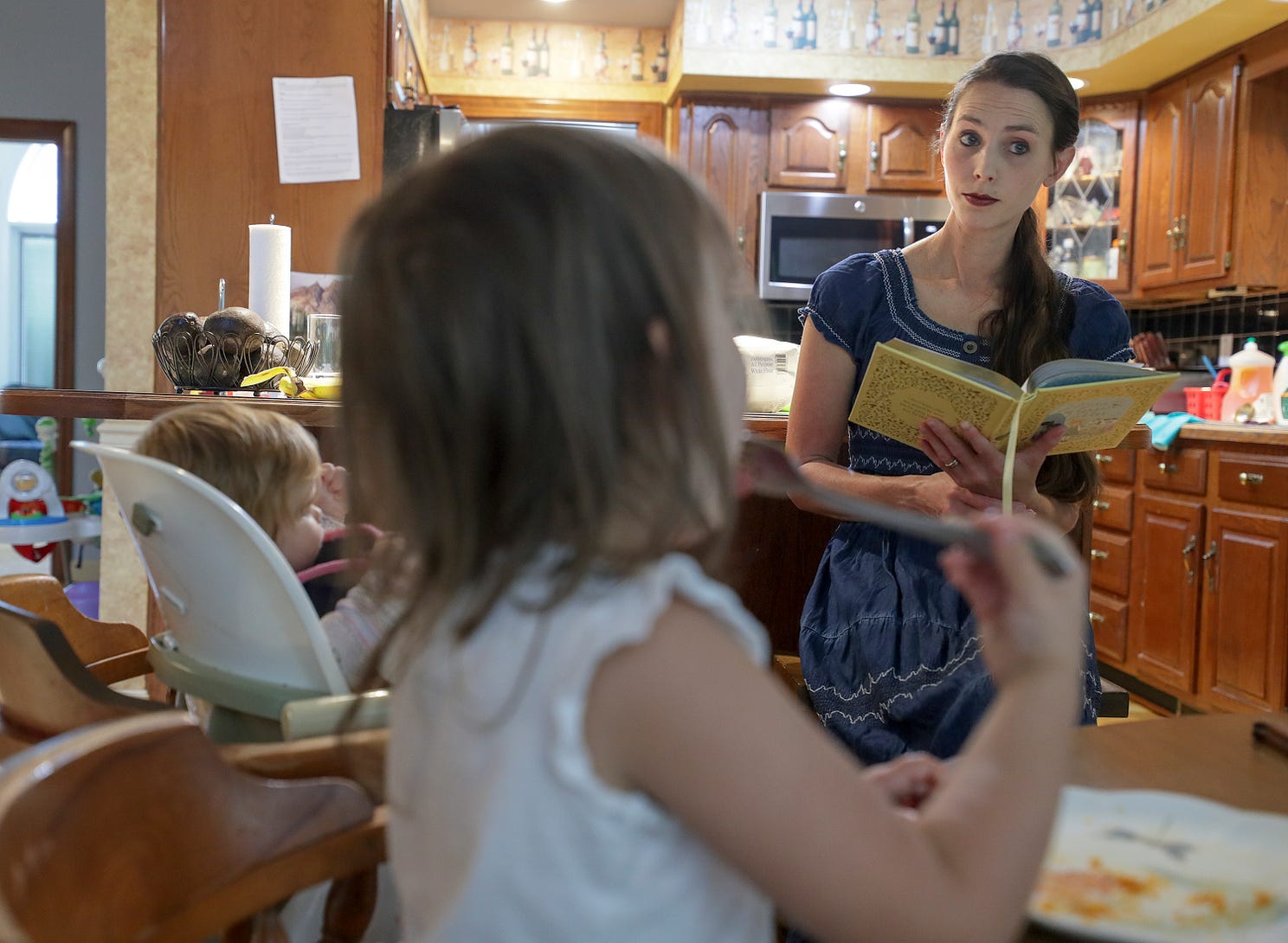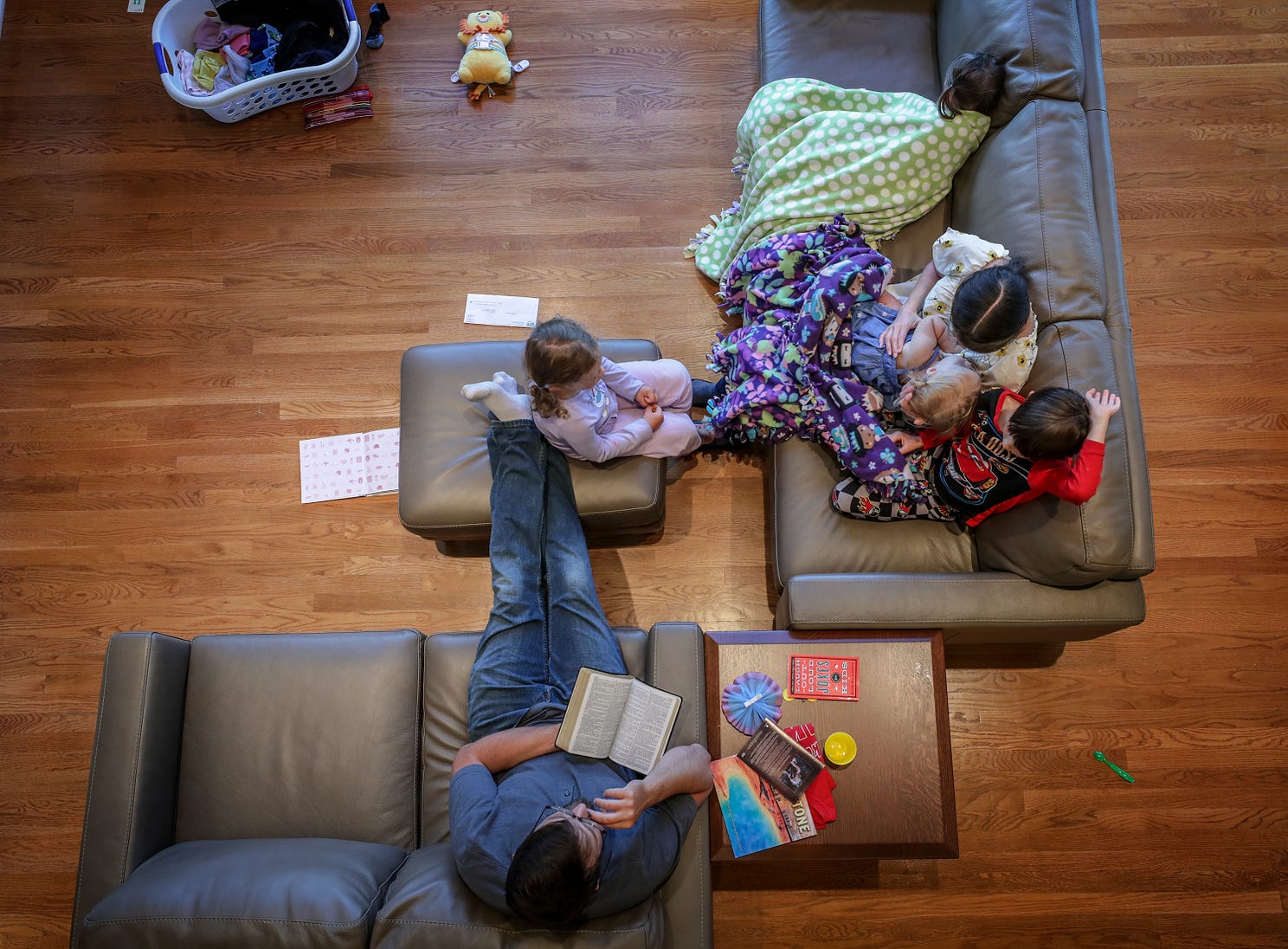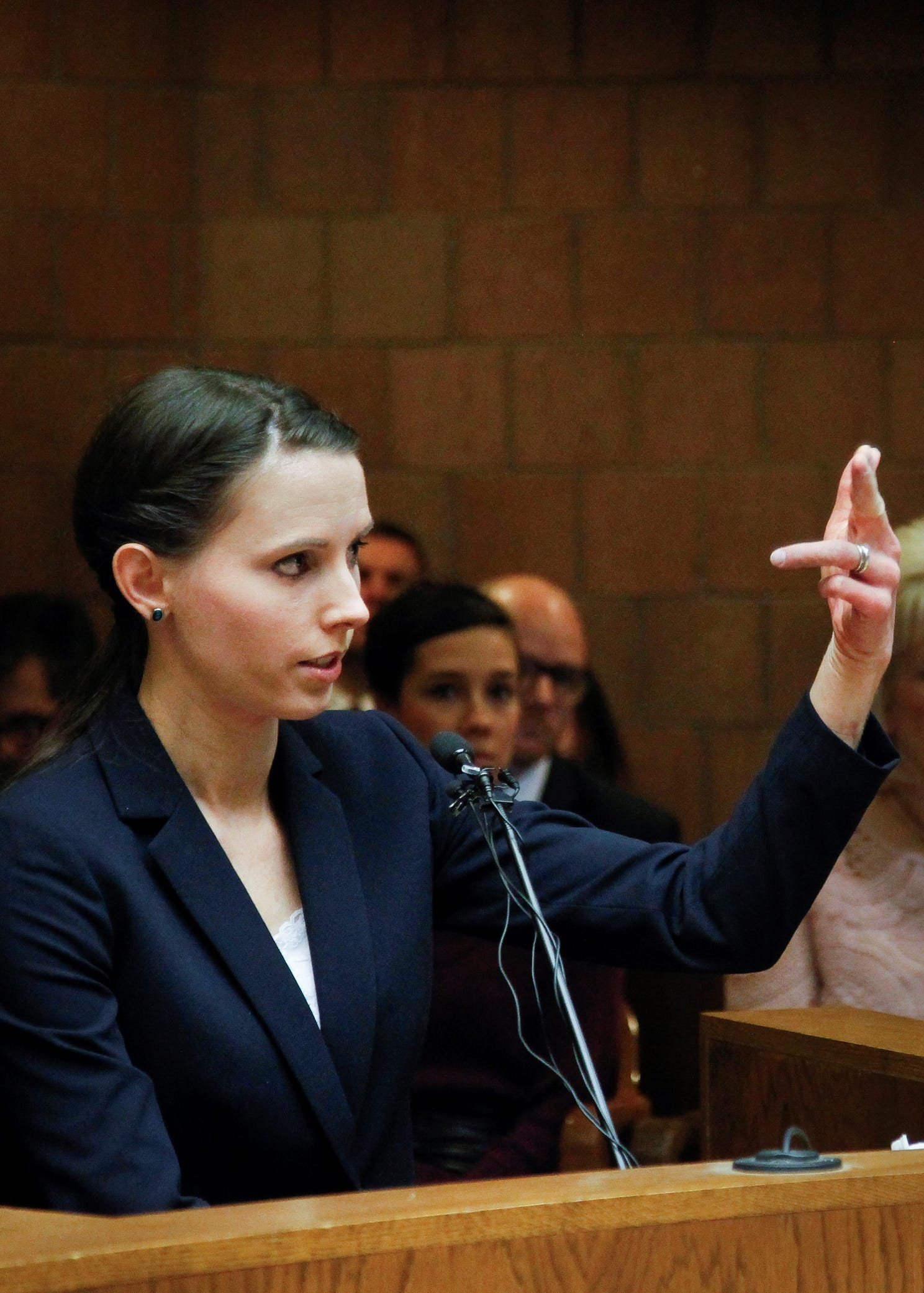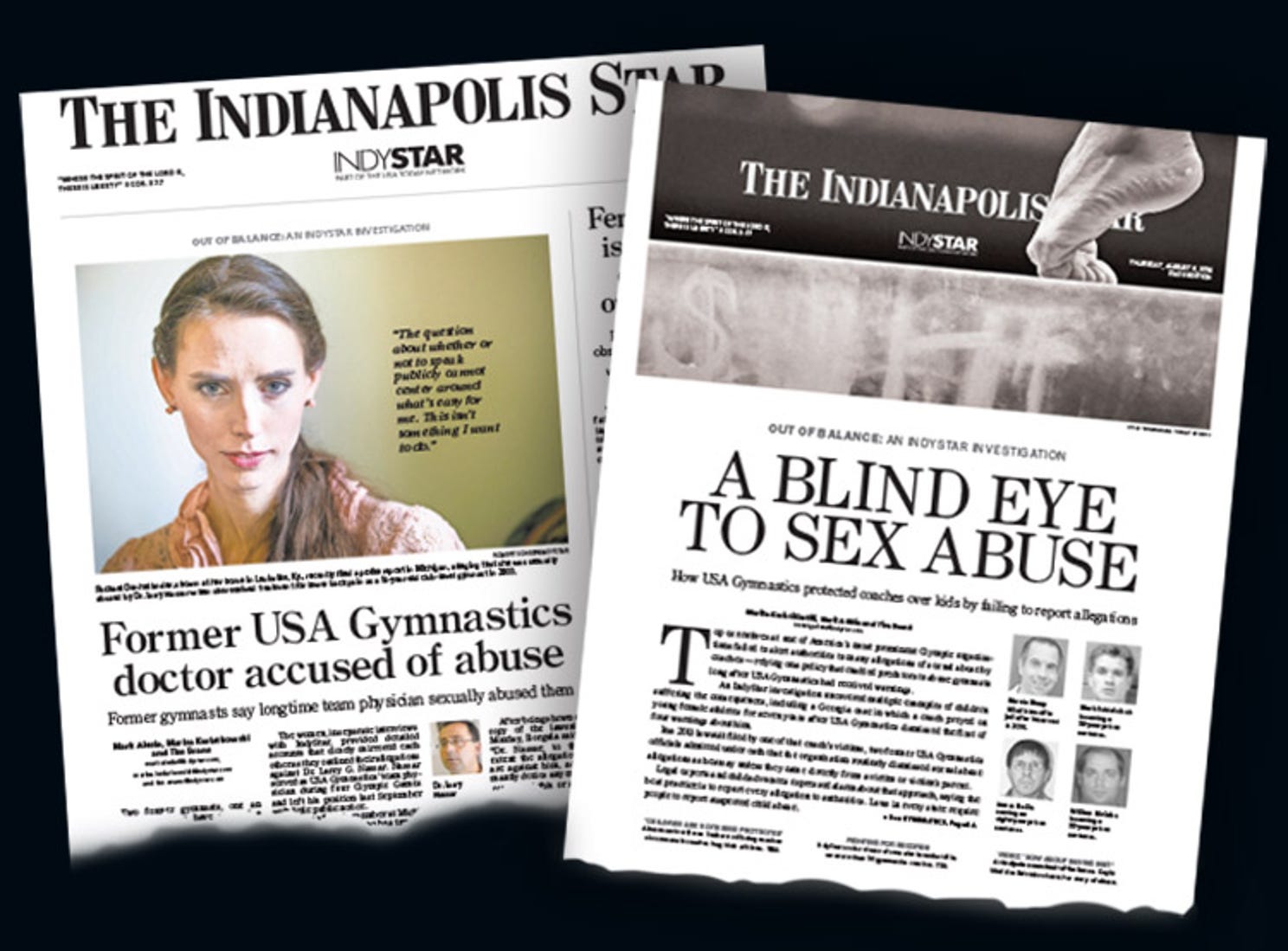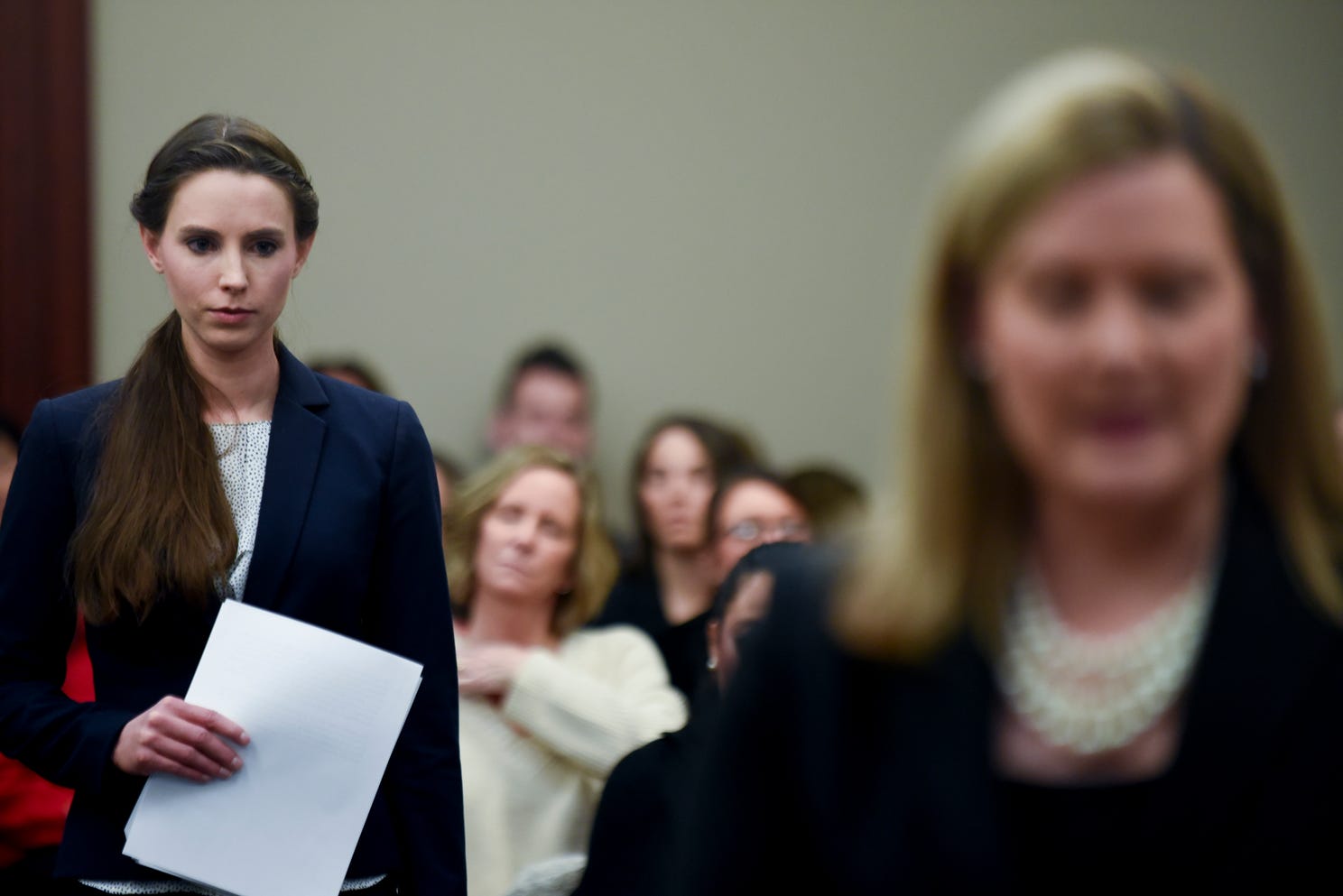She Surrendered Her Secrets to Put Away a Sexual Predator. but Her Sacrifice Isn't over
By Matt Mencarini
But she’s steadfast in her call to do what’s right, no matter the cost. And for Rachael, what’s right is to travel the country to speak out for abused women and girls, to remind them of their intrinsic worth and to challenge churches, universities and sports programs to do the right thing when allegations of abuse are exposed. This mission means more time away from family and the weight of reliving her story at the podium or in interviews every day. But she remains faithful. "You do the best with what you’re given," Rachael said. "And one day, I’m given changing diapers and teaching kids to read, and the next day this is what I’m given. And then you flip back and forth. And you do the best you can." Those closest to Rachael see God’s hand in shaping her mission. She agrees her preparation was no accident. Debate camp. Law school. A supportive family. Faith. What fortified her to come forward has sustained her these past three years as she’s endured shifts in her identity, her privacy and her duty. But Rachael doesn’t believe God purposely put her in harm’s way, nor any of the hundreds of other girls Nassar assaulted. Rachael Denhollander: Goodness, evil exist in opposition of each other Denhollander still grieves for the abuse she endured but finds some solace in "Just being able to speak the truth." MICHAEL CLEVENGER, LOUISVILLE COURIER JOURNAL "I don’t think God reaches down and puppet masters evil,” she said. “Evil exists that has a different origin. It's going to be there. It's better to be able to do something about it than not be able to do anything. "So, in a sense, yes, I wish it wasn’t me. I’m also very glad it didn’t have to be anybody else." Why Rachael chose to become a voice for justice Wearing a clearance-rack dress and her signature self-described Disney princess ponytail over her shoulder, Rachael sat on a downtown Birmingham, Alabama, stage on a summer night in June with five other pastors and advocates. The Southern Baptist Convention officially would convene the next morning, but this night was billed as a conversation about sexual abuse within the network of churches amid a national scandal enveloping the denomination. More than a thousand Southern Baptists filled the convention center hall. Most only learned about Rachael 17 months earlier, at the end of Nassar's criminal cases when the world was captivated by her story and the stories of 155 other women he had assaulted. Rachael Denhollander expresses her thoughts on stage with church leaders during a panel discussion at the Southern Baptist Convention in Birmingham, Alabama. June 2019
Now a stalwart figure among the #MeToo and #ChurchToo movements, she didn't hesitate to condemn Southern Baptist pastors for failing to protect sexual assault victims from predators within the church. She was surgical, deliberate, commanding as she spoke into a handheld microphone, never raising her voice — a woman telling men their role in a tradition that largely still doesn’t allow women to preach at all. "By and large, the survivor community loves the church," she told the crowd, filled with dozens of pastors, including some who resent her accusations and view her as an adversary. "They love Jesus. They love the Gospel. I have found my greatest refuge and hope with the Gospel. And our desire is to see the church do this better so that it becomes the refuge it was intended to be. "… You need to understand the perspective that (survivors) come from. You need to feel the grief and the betrayal and the harm and the hurt that they have felt." She wasn’t done. "I think it is very telling that I have heard hundreds, literally hundreds, of sermons directed on the quiet and submissive sphere that a woman should have. I have heard not one on how to value a woman's voice. I have heard not one on the issue of sexual assault. "… As soon as an issue comes along that needs to be fought for, all that masculinity disappears. And the women are left on the front line with you telling them, 'Be quiet, submissive, fight your battles.' "Do it. Better. Brothers." The applause started before Rachael had finished. A line, mostly of women, formed to meet her before she walked off stage. Each wanted to hug her, thank her, to tell her they, too, had been abused. Madeline, an abuse survivor whom The Courier Journal is identifying by her first name, said she watched Rachael ask a simple but powerful question at the end of the Nassar cases in 2018 before he was sentenced — "How much is a little girl worth?" Madeline cried as she spoke to Rachael. Rachael held her.
Afterward, Madeline spoke about what Rachael meant to her, describing her as a modern-day Martin Luther King Jr. "She doesn't know me, and she probably doesn't know that there are hundreds, thousands of women just watching going, 'OK, if she can do it, I can do it,'" Madeline said. "But that is what I have said to myself, 'She can do this. I can do this.'" Rachael has grown accustomed to the long lines of people who appear after speeches and panels she has attended across the country these past 19 months. "I just want to give them what they need, as much as I can in that moment," she said. "To let them know that they've been heard. That they have been powerful, they have been strong, that there's hope. "There is life afterwards." Rachael walked out of the convention center and returned to her hotel room where her husband and infant daughter awaited. She was exhausted. "I know she's very polished and everything when she talks, but it takes a toll on her because she is still an abuse survivor," Rachael's husband, Jacob, said. "She still has that trauma in her background. And now she is healed to a certain degree. But … it's still hard." The next morning, Rachael walked through the Birmingham airport, the weight from the previous night's panel gone for the moment as she held her baby. The flight back to Louisville, connecting through Atlanta, was boarding. Two more airports and two more flights lay ahead. This is her life now, the one she chose over the one she truly wants — to be at home with her husband and children. The life Rachael really wants is at home On a bright summer morning in the Denhollander kitchen, Rachael sat on a wooden countertop stool, 10-month-old Elora’s high chair pulled to her hip. She read aloud from "Anne of Green Gables," holding the book in one hand as she reached with the other to put more food on the baby’s tray. The white, solid-surface countertop showed the aftermath of an earlier nail painting attempt. Pink, green and orange smeared along two sides.
Hope, whose fourth birthday was fast approaching, knelt on a low-backed chair with tennis balls affixed to the feet to spare the hardwood floor. She wore a pink bicycle helmet covered with Disney princesses as she listened to Rachael read the story. Jonathan, the 7-year-old, perched on a stool where he could look over Rachael’s shoulder. And Grace, who’s 5, listened at the other end of the table. One of the girls interrupted to ask for more ham. "Yes, just a minute," Rachael said, before jumping back into the story. "Do your potatoes first, OK?" Rachael raised and lowered her voice for the dialogue between Anne Shirley, the book’s namesake, and Marilla Cuthbert, the woman she’d come to stay with. Marilla suspected Anne had taken her brooch. "Do you think that her window was open? Magpies?" Jonathan suggested as the potential thieves. "Oh, magpies is a good guess," Rachael told him. "I don't know, we'll have to read and see." "Maybe she's just not looking in the right drawer," Grace offered. "That's possible," Rachael said. "That's a good guess." Before she could continue, more interruptions: What’s a magpie? Why didn’t Marilla look behind her? What will happen next? Rachael cherishes summer mornings like these. All questions and theories, no matter how small or unlikely, are valid — even the ones that confused the plots of "Anne of Green Gables" and "The Hobbit," the other book they read aloud during the day.
She finds the results of the children's antics or experiments — trying to have conversations while chewing food or car tracks on the wall — too funny or ingenious to be a bother. With Rachael, a home-school teacher, every moment is a teaching moment in the Denhollander house on Louisville's eastern edge, even during the kids' summer break. Rachael's few moments to herself often don’t come until late at night, when she can reflect on the changes and disruptions her family has endured these past three years. Three houses. Countless five-hour trips to Michigan for Nassar's case. Lives in constant transition. The preparation began long before Rachael knew the name Larry Nassar. The moment that forever changed Rachael's life Nassar wasn’t the first man to sexually abuse Rachael. She was 7 when a member of her family's Michigan church inappropriately touched her as she sat on his lap. Rachael told her mother, Camille Moxon, she felt uncomfortable around him but couldn’t explain why. Some in the congregation saw the special attention the man was giving Rachael. They warned her parents, who distanced the family from the man. But others in the church didn’t believe he could be a predator and thought Rachael’s parents overreacted. They grew cautious and cold around Rachael, who was still too young to understand. All she knew was that people she loved — people she thought loved her — stopped cuddling her or holding her in their laps. The experience sparked the first lie Rachael told herself: If you can’t absolutely prove the abuse, don’t speak up because it will cost you everything. Four years later, in 1996, 12-year-old Rachael's family gathered around the TV to watch the U.S. women’s Olympic team win a gold medal in Atlanta. Her gymnastics career started shortly after that. 'How Much Is a Little Girl Worth?' read by author Rachael Denhollander Denhollander penned the illustrated children's book that reveals many of the ideals that she holds dear. MICHAEL CLEVENGER, LOUISVILLE COURIER JOURNAL She was a little girl in love with the sport — the hand grips, the old mechanic’s garage where her team worked out, her time with teammates. Rachael wasn’t a star. She didn't have the typical gymnast physique and only advanced to the lowest competitive level, but the acrobatics and maneuvers made her feel like she was flying. Still, the practices took a toll on Rachael. She injured her back so severely when she was 15 that she would wake up with a numb leg. She also had a lingering wrist injury. But she wanted back on the mat, back with her teammates. She wanted to fly again. So in early 2000, Rachael and her mother drove 70 miles from Kalamazoo to East Lansing to see Nassar. They walked down the medical clinic hallway, past photos of Olympians, both in awe that a doctor who worked with gold medalists had made time for them. If anyone could help her, mother and daughter hoped, Nassar could. The abuse began during Rachael's very first appointment.
During appointments over the years that followed, Rachael lay on his exam table, her head toward her mother, sometimes wearing baggy athletic shorts or covered with a towel. Nassar positioned himself so Rachael’s mother couldn’t see his hands. Rachael had no idea her mother didn't know what Nassar was doing when he was supposed to be treating her back. She would lie on the table feeling humiliated and degraded as Nassar penetrated her vagina with his fingers. Sometimes for as long as 40 minutes. "The best I could figure was it had to be legitimate," Rachael said, looking back. "He couldn’t be the national team physician, he couldn’t be teaching osteopathic medicine, he couldn’t be this revered physician if he wasn’t doing legitimate medicine." This was the second lie Rachael told herself: That Nassar, because of who he was, couldn’t be an abuser. But still, she’d lie in bed at night shaking her head, trying to reconcile how she felt with the lies she believed. She balled her hands into fists and dug her fingernails into her palms, the pain giving her mind somewhere to focus. Then came the third lie she told herself: She was the problem and couldn’t trust her instincts. On one of the final appointments, Nassar massaged her breast. She didn’t scream or cry or reach out to her mother. She froze. That was the last time he abused her. He stopped scheduling her for appointments in late 2001. She never got an answer as to why he stopped. Maybe he lost interest or got what he wanted, she thought. The damage from the abuse continued to fester. Rachael became uncomfortable around men, tensing if they stood behind her. She had nightmares about hands and about the abuse. In some nightmares, she was assaulted by someone other than Nassar, someone she knew or loved. After noticing her daughter’s changed behavior, Rachael’s mom pushed for details. Rachael told her that Nassar molested her and that she saw him sexually aroused during one appointment. Her mother asked: Do you want to go to the police? This was the first time, but not last, Rachael faced this question. She wanted to do something because she doubted she was Nassar’s only victim and didn't think he'd stop abusing. But she didn’t know what. Could she come forward and keep her identity hidden? Would anyone believe her? Too many questions without answers. Too many barriers for a teenager to navigate. Rachael felt despair set in along with the reality that there was nothing she could do. "Silence seemed safer," she said. Years passed. Bearing the abuse and trauma in her mind alone wasn't working, so she resolved to find a way. On May 5, 2004, Rachael picked a folder with babies on the cover, a happy and innocuous image, thinking people would leave it alone if they found it. Page by page Rachael filled up her folder. "How do you explain to someone the confusion, sick feeling, and shame without knowing why?" she wrote on one page. "It was never the hand in the dark," she wrote on another. "It was always the hand I held. And it’s your fault all over again, because it never would have happened if you hadn’t trusted." At one point she wrote: "I was too terrified and ashamed, (too) confused, to understand back then, but the price for not understanding then, is that no one understands now. What I thought was my fault then, most think is my fault now." Despite the trauma and shame, Rachael dove into topics she loved — law, debate and public policy. She passed the bar by 25, excelled at mock appellate arguments and thought of a career as a constitutional lawyer, arguing before the Supreme Court. And she wanted a family. She'd been planning it for decades. That plan began to come together in 2006 when Rachael met her future husband in the comments sections of a satire blog. From the same little desk where she sat and wondered whether Nassar had stolen something irreplaceable from her, she also wrote to Jacob Denhollander. Her messages went from her home in Kalamazoo to his in Salmon Arm, British Columbia. Jacob lived on a mountain with lots of books and little siblings, which appealed to Rachael's heart. They had the same religious convictions — that you need to live your faith constantly — and the same sense of humor, which reflected their love of classic literature and sometimes more than a hint of sarcasm. After a year of emails, Jacob flew to Kalamazoo so they could finally meet face to face, at the baggage claim at the airport. "He had really nice eyes," Rachael recalled. Within days, Rachael could see a life with Jacob. He, on the other hand, wondered what he could add to the life of this smart, capable woman he was falling in love with. Rachael knew before he left she had to reveal the secret she'd kept locked away. She had to know if she could trust him — if he believed her. Rachael told Jacob when the two went for a walk. She kept her eyes down waiting on his response. Jacob believed her and now knew what he could bring to the relationship. He could support and protect her. He could be the one person she let see inside her heart. They married in 2009 and in 2012 moved to Louisville, where Jacob started at the Southern Baptist Theological Seminary. By 2016, they had three children under age 5 and lived in a tiny, 1,000-square-foot home in the city’s Clifton Heights neighborhood. Rachael home-schooled the two older children. They loved it because they were so close. Then one August morning in 2016, Rachael opened her computer to type up a grocery list. She saw an Indianapolis Star article trending on Facebook: USA Gymnastics had covered up sexual abuse complaints against coaches for decades. In that moment, her life changed. She read the story over and over while holding her baby daughter, thinking about all the little girls in the story who had been sexually assaulted. She knew there was another abuser, one who remained unmasked: Larry Nassar. Rachael laid the baby’s head on her shoulder and took a deep breath. Merely thinking of what might happen if she came forward made her feel like she might vomit. Her body flushed with sudden fear that wouldn't fade. Fifteen years after her abuse ended, Rachael had reached a good place in her healing. The flashbacks and nightmares were less frequent. She had the life she wanted. But she thought back to the night before she turned 25, when she couldn't sleep, thinking that the milestone birthday pushed her case against Nassar past the criminal statute of limitations in Michigan. Rachael Denhollander So, in a sense, yes, I wish it wasn’t me. I’m also very glad it didn’t have to be anybody else. But now, she thought, even if Nassar could never be charged with abusing her, her voice could help other girls. She opened up her email and began to type. "I recently read the article titled 'Out of Balance' published by the IndyStar. My experience may not be relevant to your investigation, but I am emailing to report an incident," she wrote to the newspaper, giving them a new name. "… I have seen little hope that any light would be shed by coming forward, so I have remained quiet. If there is a possibility that is changing, I will come forward as publicly as necessary." Rachael decides to surrender her secrets In late August 2016, Rachael sat in her Louisville living room and told two journalists, both men, from The Indianapolis Star what she had kept to herself for half her life. Rachael had to tell the whole truth. The journalists were there for hours, and once the camera started recording, Rachael never took a break.
"It's very difficult to come forward against somebody who's as prominent as he is," she told them. Starting when Rachael was 15, she told the reporters, Larry Nassar unhooked her bra and massaged her breasts. He penetrated her with his fingers. Her mother was there for all of it, even though she didn't know what was happening. That's why Rachael didn't stop it. Jacob sat near Rachael, listening to details he’d never heard before. Rachael knew other victims would read her story. She wanted them to know they weren’t alone. The journalists left and Rachael walked up to Jacob. She smiled as he wrapped his arms around her and she fell against him, exhausted and unsure what came next. Days later, they drove to the Michigan State University Police Department — to people she feared might protect Nassar — because she’d learned the statute of limitations hadn’t expired. The detective needed to know everything. From the moment she decided to come forward, Rachael knew she’d have to sacrifice more than anonymity. She knew she’d have to surrender her deepest thoughts. She dug her journal out of storage and mailed it to police. Her secrets were no longer hers. Doing the right thing began to exact its toll. Rachael lost weight. She was often sick and lightheaded, with a constant sense of being unsafe and exposed both emotionally and physically. The family was at a church festival on a day she thought the article would publish. She was too emotionally drained to plan Jonathan’s fifth birthday party. "I felt like I was just robbed of those experiences," she said. "That my kids were robbed of having me present." Nine months after going to police, Rachael sat 10 feet away from Nassar in a dark courtroom in Michigan, its walls closer than she had expected. She sat for more than two hours during a hearing to determine whether there was sufficient evidence to take the case to trial. She described every horrid detail of her abuse, even raising her hands to show how Nassar violated her. "At the point that I relinquished my privacy, there was a train that just wasn't going to stop. And I knew that," Rachael said. "Anything I testified to, all of those details, it was tied to me. And there was no way to stop that. … So if there's not a way to stop it — maximize it for the benefit." That’s why Rachael took the unusual step to insist the courtroom be open to media, with no restrictions on what could be shown or reported. This way, Nassar couldn’t hide, and she gave other victims a glimpse of the courtroom. There was the contentious cross-examination from one of Nassar’s attorneys, who questioned Rachael on why she spent so much time building and preparing her case before going to police. "I’m an attorney," Rachael replied. "I knew what you would ask." In many ways, this day was worse than the abuse itself, Rachael said. There was an audience now, inside and outside the courtroom. She was physically and emotionally exhausted. Jacob got a hotel room so Rachael could have some space to process the day. He held her, and they talked, his touch and presence a way to imprint good memories over the bad in Rachael's mind. It's what Jacob could do that no one else could. The torment of the case wasn’t over. Over the months that followed, Rachael looked at her daughters practicing ballet or reading and couldn’t help but see all the little girls Nassar abused, the ones she was now trying to protect. Little girls and grown women dragged into the case, whose wounds were reopened because of her. Little girls and women who didn’t know they’d been sexually abused because they still believed those lies. That is, until Rachael spoke up. She kept talking to reporters, which triggered more nightmares but brought more women and girls forward, strengthening the case. As 2017 neared an end, the case took an unexpected turn. Nassar’s attorneys reached out to state prosecutors looking for a plea deal. If Nassar wanted to avoid a trial, the prosecutor had conditions. Chief among them: That every victim be given the chance to speak during his sentencing. So starting on the morning of Jan. 16, 2018, Rachael sat in courtrooms over three weeks and listened as 203 women and girls voiced their trauma and pain. She wanted to hear every word.
Rachael embraces the job she never wanted On Feb. 5, 2018, Nassar walked out through a corner of the courtroom wearing an orange jail jumpsuit, his hands folded and cuffed to the waist restraint. He looked down as he disappeared through the doorway on his way to prison. TV satellite trucks lined the road in front of the courthouse. Rachael stood inside, surrounded by reporters and cameras, microphones held out to capture her words. Camera lights lit up her face. "We have taken care of one perpetrator," she told reporters. "We have not taken care of the systems that allowed him to flourish for 20 years." In that moment, Rachael fully embraced her role as an advocate. "What do you do when you have something that's important to do," she said later, "and you can do it very well, and you don't want to do it?" She wrapped herself in a pink blanket late at night and started writing her memoir — "What is a Girl Worth?" And then a children's book with a similar name — "How Much is a Little Girl Worth?" She continued the interviews, pushing for reforms at Michigan State University and USA Gymnastics. She crisscrossed the country, meeting with victims and lawmakers, pushing for new laws in such places as Michigan and Vermont. Rachael Denhollander We have taken care of one perpetrator. We have not taken care of the systems that allowed him to flourish for 20 years. She spoke out about sexual abuse scandals involving a doctor at the University of Southern California, within the Catholic Church and in the Southern Baptist community. Not everyone was receptive to her message. "Everybody's really appreciative of what I did with Larry, because everybody knows who Larry is now," she said. "Everybody got to see. But when I speak up with the church community, well that's different for a good number of people. When I speak up about certain politicians on both sides of the aisle, well that's different. When I speak up against certain sports teams or other universities, well that's different. "Everybody has that instinctive community response. And the real test for how much we understand the dynamics of abuse, and how committed we are, is what we do when it's in our own community. What do we do when it will cost?" The truth is, the outcomes in the Nassar cases — the convictions and long prison sentences and some semblance of justice — were never as inevitable as they seemed when it was all over. And the possibility that Rachael's efforts and sacrifices could have ended unsuccessfully was never far from her mind. Rachael needed The Indianapolis Star reporters to write the story that prompted her to come forward. She needed the detective who believed her and the prosecutor who saw her case and the others as worth the fight. There were hundreds of women and girls who followed Rachael in telling their stories of abuse and trauma, their collective voices becoming too loud for the world to ignore. But someone needed to sacrifice to start it all. That was Rachael. "He didn't remember who I was anymore," she said of Nassar. "He didn't remember what he did. But he does now. I don't like that. I don't get to be forgotten anymore. "And I think some of that, I guess, could be a power thing. 'Well, he'll remember me forever.' But it's not like that. That's not how I feel about it. I would rather be one of the hundreds that he doesn’t remember anymore because he did it so much." Rachael knows #MeToo and #ChurchToo hashtags alone won't get victims into a prosecutor's office, a courtroom or a therapy appointment. That's why she steps to the podium, meets with victims and grants interviews when she'd rather be home reading to her children. "I'm a Calvinist, so I think God has a plan for everything," her husband, Jacob, said. "But I think that in some cases, you definitely see his providence more clearly than in other instances. "The question becomes, I think, was she prepared for exposing Larry Nassar or was Larry Nassar preparing her for something else? And I'm becoming more convinced that Larry Nassar was preparing her for something else." The place where Rachael is truly happy Rachael stood at a lectern in a sunshine-flooded dining room at the Teton Pines Resort and Country Club on a clear Wyoming morning in late June and told her story once again. The abuse from both men. The lies she once told herself. "Not facing the reality of what I had lost and the damage that was done seemed less painful," she said to the group gathered at a fundraiser for sexual assault and domestic violence victims. "But in reality, it kept me from the truth, and it kept me from healing." The crowd of 150 advocates, law enforcement members and donors gasped when Rachael told them about the institutional failures at Michigan State and USA Gymnastics that allowed Nassar’s abuse to go on for so long. They sat captivated. Unlike most trips where Rachael tries to minimize time away from the kids, this one was a family vacation. As Rachael spoke, Jacob and the four children explored exhibits in the Jackson Hole Children’s Museum. She spoke again that afternoon to another group, delivering a similar message. "We have to start understanding how abusers wield the circumstances around them to make abuse seem impossible," she told the crowd. "Larry did abuse most of his victims right in front of their parents. "And that really was, I think, one of the most horrific things he did. Because the reality that most parents have to grapple with is that they sat there and watched their daughters get molested, and they had no idea what was happening." A line waited for her shortly after her speech. People stopped her on the way to thank her. They see her as a champion for their cause. A hero. A light in the darkness. But Rachael's nightmares remain. Her wounds are permanent. She doesn’t yet know how to fully heal. "I've talked about seeing a counselor, just to have somebody to talk to besides (Jacob), because he carries it a lot," Rachael said. "I just don't know if I want to add one more thing to my schedule, if that makes sense. Like it's just, it's so busy. "I don't know ultimately if it would end up helping or just be frustrating because it's one more thing to do." During their time in Wyoming, Rachael hoped to re-create a vacation she went on with her family when she was 12. A time before Larry Nassar. A trip filled with memories she still treasures: hiking and praying with her family, and her father reading "The Hobbit" aloud while nature surrounded them. On this sunny June morning, Rachael, Jacob and their children started their hike in the Teton mountain range up a twisting path, each turn getting them closer to the Hidden Falls, the first stop. "It’s called hidden waterfall because it’s like a secret," Rachael told Hope. They reached the falls, stopping for a snack break and to take in the rushing falls. They carried on up the mountain with periodic stops so the kids could do some amateur "bouldering" up and down small rock faces along the path. Grace is already developing an interest in gymnastics. She borrows Rachael’s phone to watch gymnastics videos online, and Rachael worries about what else she might find. Jonathan has already asked what a pedophile is. It’s a crime, they told him. "Every once in a while they tell everybody their mom's famous," Rachael said. "It's weird. We try to really temper that because I'm not famous, but that's the impression they have because I was on TV." The older kids don’t remember much of life before the case, but they’ve sacrificed just as Jacob and Rachael have. Grace and Hope missed ballet lessons. Jonathan missed a hockey season. This was part of the consequences of sin, Rachael told them, and it goes much further than they know. One day, Rachael and Jacob will have to tell their children what their sacrifices were for. But on this day, as the midday sun warmed the walk, the Denhollanders left the forest behind for rocky and twisting passages, the elevation rising. When they reached Inspiration Point, at the 7,200-foot mark, the path widened and led to a plateau. Rachael looked out over a skyline that stretched for miles, happy once again to be in the mountains. "They're immovable. They're always there," she said. "I think they're just an incredible combination of strength and beauty both. I mean, you see that a lot in nature, but they don't change. They've planted themselves and they are going to stay. They're not moving, not for anybody. "And yet they're just indescribably beautiful at the same time. I love that combination. It's very restful. It's secure." Grace, Hope and Jonathan sat along the ridge as Jacob read aloud from "The Hobbit." Rachael stood behind them, her eyes on Elora, sound asleep on her chest, little legs poking out of pink pants as Rachael’s arms cradled her and her dreams. Soon they’d start the hike back down, a family vacation coming to an end, with Rachael’s other life waiting to pull her away. The autumn will be filled with a national book tour and more speaking engagements, and all that accompanies those things: More postponed healing. More nightmares. More sacrifices. But up here on this mountain, Rachael brushed the hair from Elora's sleeping face, leaned down and kissed her head. In this moment, Rachael is where she always wanted to be.
|
.
Any original material on these pages is copyright © BishopAccountability.org 2004. Reproduce freely with attribution.
